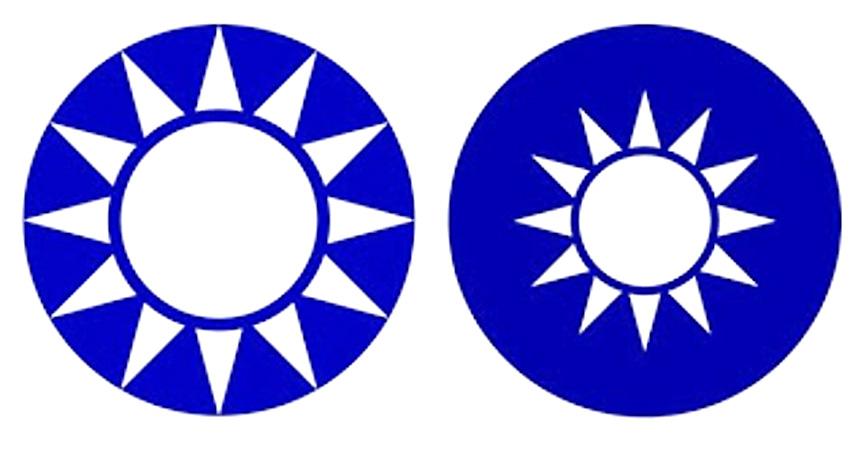Changing the national emblem should not be taken lightly, as it embodies the nation’s collective sentiment, but political party symbols can and should change with the times, the Ministry of the Interior said on Thursday in a report on the issues stemming from similarities between the national and Chinese Nationalist Party (KMT) emblems.
The ministry issued the report in response to a motion raised by the New Power Party caucus and passed on Jan. 29 requesting an evaluation within two months.
Since its installment in 1928, the national emblem has been broadly applied on the national and military flags, medals, uniforms, certificates, foreign embassies and other places, it said.

Photo: Chen Yu-fu, Taipei Times
Changing the emblem would involve difficult legal amendments and considerable expense to redesign all of the aforementioned applications, it said.
The ideological strife it would exacerbate is also a concern, potentially spilling over into the nation’s international dealings, the report added.
The nation went through a long period of authoritarian rule that erased the lines between party and state, but has been lauded the world over for its transition to democracy, earning it the moniker “the beacon of democracy in Asia,” it said.
Although the similarity between the national and KMT emblems is based in history, the national emblem is a symbol of the nation and changing it should not be considered lightly, the ministry said.
On the other hand, the symbols of political parties can and should change to reflect current sentiment, it said.
The party-state era is over and the political arena has become diversified, so political symbols should change to respect the national emblem, it added.
In response, KMT Chairman Johnny Chiang (江啟臣) wrote on Facebook that the suggestion was a deliberate attempt by the Democratic Progressive Party (DPP) to shift the public’s focus from the deadly train accident in Hualien County on Friday last week, claiming the lives of 50 people and injuring more than 200 others.
Taking up the issue is a scheme on the DPP’s part to shift the public’s attention from the tragedy and to dodge its responsibility, which is a disgrace to those who perished in the accident and their families, Chiang said.
He also questioned the DPP’s loyalty to the nation, its flag and the national emblem.
“If the DPP fully identifies with the Republic of China, the KMT will be happy to see it incorporate elements of the national flag and national emblem into its party emblem,” he said.
Deputy Minister of the Interior Chen Tsung-yen (陳宗彥) yesterday said the report only offers an analysis of the current situation and is not a demand for any political party to change their party emblem.

Taiwan has received more than US$70 million in royalties as of the end of last year from developing the F-16V jet as countries worldwide purchase or upgrade to this popular model, government and military officials said on Saturday. Taiwan funded the development of the F-16V jet and ended up the sole investor as other countries withdrew from the program. Now the F-16V is increasingly popular and countries must pay Taiwan a percentage in royalties when they purchase new F-16V aircraft or upgrade older F-16 models. The next five years are expected to be the peak for these royalties, with Taiwan potentially earning

STAY IN YOUR LANE: As the US and Israel attack Iran, the ministry has warned China not to overstep by including Taiwanese citizens in its evacuation orders The Ministry of Foreign Affairs (MOFA) yesterday rebuked a statement by China’s embassy in Israel that it would evacuate Taiwanese holders of Chinese travel documents from Israel amid the latter’s escalating conflict with Iran. Tensions have risen across the Middle East in the wake of US and Israeli airstrikes on Iran beginning Saturday. China subsequently issued an evacuation notice for its citizens. In a news release, the Chinese embassy in Israel said holders of “Taiwan compatriot permits (台胞證)” issued to Taiwanese nationals by Chinese authorities for travel to China — could register for evacuation to Egypt. In Taipei, the ministry yesterday said Taiwan

‘LIKE-MINDED PARTNER’: Tako van Popta said it would be inappropriate to delay signing the deal with Taiwan because of China, adding he would promote the issue Canadian senators have stressed Taiwan’s importance for international trade and expressed enthusiasm for ensuring the Taiwan-Canada trade cooperation framework agreement is implemented this year. Representative to Canada Harry Tseng (曾厚仁) in an interview with the Central News Agency (CNA) said he was increasingly uneasy about Ottawa’s delays in signing the agreement, especially as Ottawa has warmed toward Beijing. There are “no negotiations left. Not only [is it] initialed, we have three versions of the text ready: English, French and Mandarin,” Tseng said. “That tells you how close we are to the final signature.” Tseng said that he hoped Canadian Prime Minister Mark Carney

POSITIVE DEVELOPMENT: Japan and the US are expected to hold in-depth discussions on Taiwan-related issues during the meeting next month, Japanese sources said The holding of a Japan-US leaders’ meeting ahead of US President Donald Trump’s visit to China is positive news for Taiwan, former Japan-Taiwan Exchange Association representative Hiroyasu Izumi said yesterday. After the Liberal Democratic Party’s landslide victory in Japan’s House of Representatives election, Japanese Prime Minister Sanae Takaichi is scheduled to visit the US next month, where she is to meet with Trump ahead of the US president’s planned visit to China from March 31 to April 2 for a meeting with Chinese President Xi Jinping (習近平). Japan and the US are expected to hold in-depth discussions on Taiwan-related issues during the